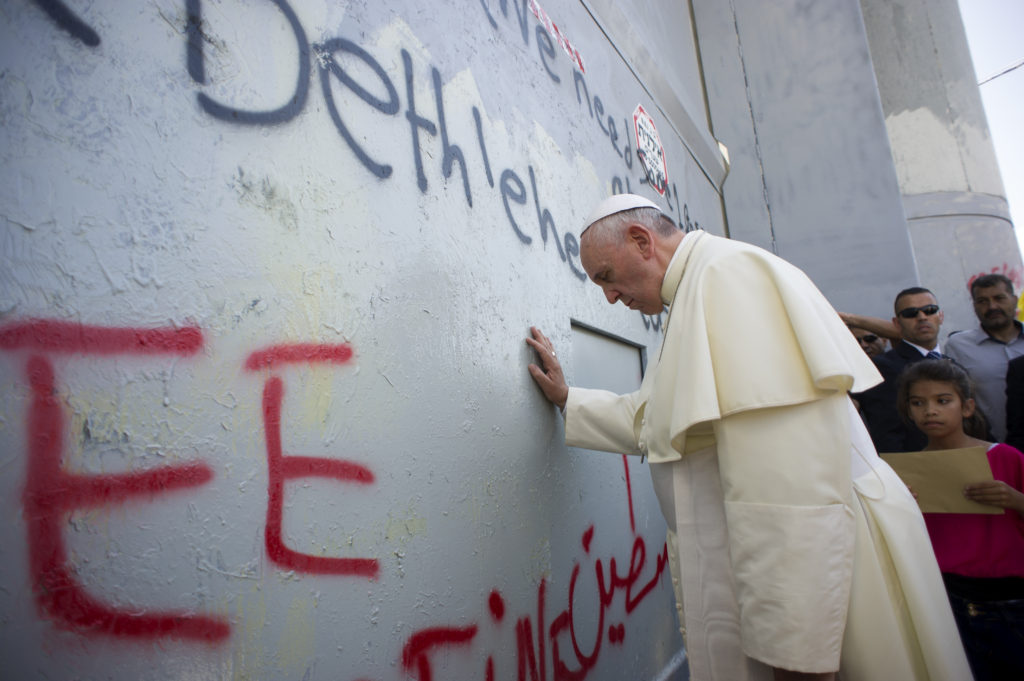

BETHLEHEM, West Bank (CNS) — Pope Francis invited Palestinian President Mahmoud Abbas and Israeli President Shimon Peres to pray together at the Vatican for peace between their nations.
The pope made the announcement May 25, after praying the “Regina Coeli” at the end of Mass in Bethlehem’s Manger Square.
Earlier in the day, he made an unscheduled stop to pray before a controversial separation wall, built by Israel over Palestinian protests, between its territory and the West Bank.
“All of us, especially those placed at the service of their own peoples, have the duty to serve as instruments and constructors of peace, above all in prayer,” the pope said after the Mass.
Jesuit Father Federico Lombardi, the Vatican spokesman, told reporters no date had been set for the prayer session in Rome, but that he hoped it would be soon.
Peres’ term of office as president expires in July.
Father Lombardi said as far as he knew no pope had issued a similar invitation before.
Also the same morning, at a meeting with Palestinian leaders, Pope Francis voiced his sympathy with “those who suffer most” from the decades-long Israeli-Palestinian conflict, a situation he called “increasingly unacceptable.”
During a speech to Abbas and other dignitaries in the presidential palace, the pope decried the Israeli-Palestinian conflict’s “tragic consequences,” including “insecurity, the violation of rights, isolation and the flight of entire communities, conflicts, shortages and sufferings of every sort.”
“In expressing my closeness to those who suffer most from this conflict, I wish to state my heartfelt conviction that the time has come to put an end to this situation which has become increasingly unacceptable,” he said.
The pope said lasting peace would require the “acknowledgement by all of the right of two states to live in peace and security within internationally recognized borders.”
“Each side has to make certain sacrifices,” Pope Francis said, calling on Israelis and Palestinians alike to “refrain from initiatives and actions which contradict the stated desire to reach a true agreement.”
The pope also expressed his concern for Palestinian Christians, who he said contributed “significantly to the common good of society” and deserved accordingly to be treated as “full citizens.”
Christians make up an estimated 1 percent of the 4.5 million people living under the Palestinian authority.
The pope voiced hopes that an eventual agreement between the Vatican and the Palestinian Authority on the status of Catholics would guarantee religious freedom, since “respect for this fundamental human right is, in fact, one of the essential conditions for peace, fraternity and harmony.”
His words echoed his remarks the previous day in Amman, Jordan, where he called for religious freedom throughout the Middle East, including respect for the right to change one’s religion.
Following his meeting at the presidential palace, Pope Francis rode in his popemobile to Bethlehem’s Manger Square, where he celebrated Mass.
Passing a section of the separation wall, the pope unexpectedly stopped the vehicle and alighted, then walked over to the graffiti-covered structure and rested his forehead against it in silence for a few moments. Jesuit Father Federico Lombardi, the Vatican spokesman, later confirmed that the pope had been praying as he stood against the wall.
Father Lombardi told journalists after the Mass the stop was a very important symbol of the pope’s understanding of the significance of the wall and was a manifestation of his identification with the suffering of the people, even though he made no mention of the wall in his spoken statements.
— By Francis X. Rocca, Catholic News Service. Contributing to this story was Judith Sudilovsky in Jerusalem.





